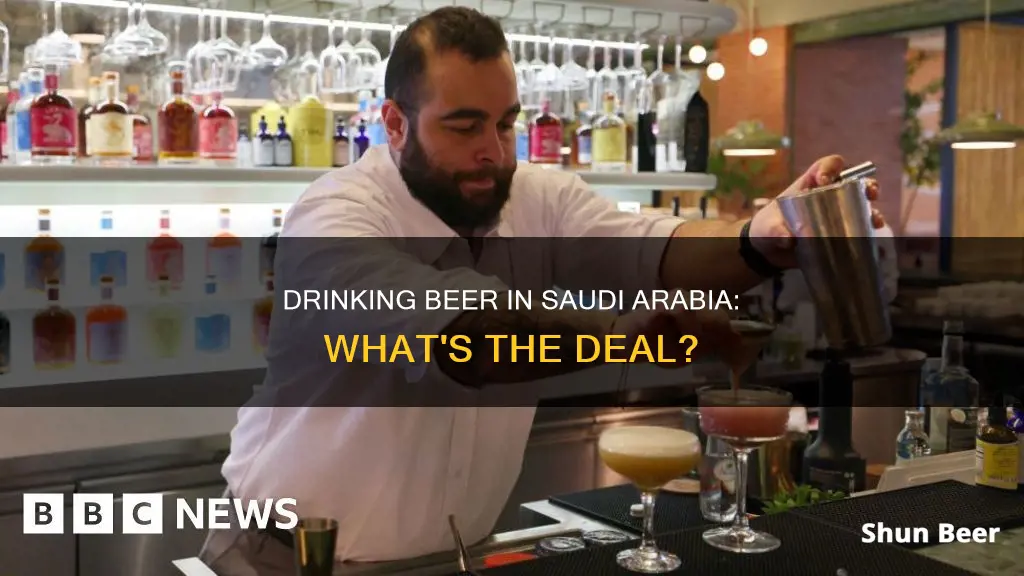
Saudi Arabia is one of the few countries where drinking alcohol is prohibited. This is due to the country's adherence to Islamic law and its conservative culture. The manufacture, distribution, and consumption of alcoholic beverages are banned in Saudi Arabia, and those who break these laws can face severe consequences. However, there have been recent reports of plans to abolish the ban on alcohol in the country, with a resort on the Red Sea island of Sindalah expected to serve alcoholic drinks.
| Characteristics | Values |
|---|---|
| Alcohol consumption | Prohibited by law |
| Alcohol possession | Criminal offence |
| Alcohol manufacture | Prohibited by law |
| Alcohol distribution | Prohibited by law |
| Alcohol sale | Prohibited by law |
| Alcohol import | Prohibited by law |
| Alcohol-related punishment | Public flogging, fines, lengthy imprisonment, deportation |
| Alcohol treatment centres | Available in Jeddah and Riyadh |
| Alcohol consumption exceptions | Foreign delegates, diplomats, foreign embassies |
What You'll Learn
- Drinking alcohol in Saudi Arabia is prohibited by law
- Foreign diplomats and embassies are allowed to drink liquor
- Drinking alcohol is considered a crime against God in Saudi Arabia
- The punishment for drinking alcohol can include public flogging, fines, or imprisonment
- There are black-market alcoholic beverages available in the country

Drinking alcohol in Saudi Arabia is prohibited by law
The consumption, possession, and distribution of alcohol in Saudi Arabia are criminal offenses, and those who are caught face severe consequences, including incarceration, fines, and even lashes. Even bringing alcohol into the country can result in hefty fines or jail time. Foreign nationals working in diplomatic missions or international organizations may be eligible for a permit to purchase alcohol for personal use, but this must be renewed annually.
Despite the strict laws, there are some exceptions and workarounds. Foreign delegates, diplomats, and embassies are allowed to drink liquor, and there is a store in Riyadh where non-Muslim foreign delegates can buy alcohol for personal use. Additionally, there are reports of Westerners living in compounds who drink alcohol openly, and some "NO GO COMPOUNDS" where foreigners arrange alcoholic parties. However, these parties are illegal, and those who are caught trading or drinking alcohol face harsh punishments, including lashes and deportation.
In recent years, Saudi Arabia has implemented social reforms, such as allowing women to drive and unrelated men and women to mix in public places. There have also been reports that the country plans to offer alcohol at a new resort, which would mark the first time alcohol is permitted for sale in the kingdom. However, as of now, the consumption of alcohol in Saudi Arabia remains illegal, and travelers are strongly advised to abstain from drinking or possessing alcoholic beverages while in the country.
Head Injuries and Alcohol: What You Should Know
You may want to see also

Foreign diplomats and embassies are allowed to drink liquor
Drinking alcohol in Saudi Arabia is prohibited, and the law is consistent with the country's reputation for adhering to Islamic law and maintaining a conservative culture. However, in 2024, Saudi Arabia lifted the alcohol ban for foreign diplomats and embassy staff. This means that diplomatic staff can now purchase and consume alcohol within the country.
The new policy allows foreign diplomats and embassies to buy alcohol from a licensed shop in Riyadh's Diplomatic Quarter. To make a purchase, they must present their diplomatic passports and register to buy fixed amounts of spirits, wine, and beer. This change aims to address the uncontrolled practice of smuggling alcohol in diplomatic pouches, which Saudi authorities cannot inspect.
The Saudi government has set a quota for diplomats to import specific quantities of alcoholic beverages for personal use. The monthly limit is set at 240 "points" of alcohol, with one litre of spirits worth six points, one litre of wine worth three points, and one litre of beer worth one point.
It is important to note that the consumption, possession, or sale of alcohol for non-diplomats in Saudi Arabia is still illegal and punishable by fines, jail time, flogging, or deportation. The country's stance on alcohol remains consistent with its interpretation of Islamic law, which forbids the manufacture, distribution, and consumption of alcoholic beverages.
The lifting of the alcohol ban for foreign diplomats and embassies is part of Crown Prince Mohammed bin Salman's Vision 2030 plan. This initiative aims to liberalize the kingdom and diversify its economy by attracting multinational companies and tourists.
Beer and Prostate Surgery: What You Need to Know
You may want to see also

Drinking alcohol is considered a crime against God in Saudi Arabia
Alcohol consumption is strictly prohibited in Saudi Arabia, which is known for its adherence to Islamic law and conservative culture. Drinking alcohol is considered a crime and is punishable by law, with severe consequences such as incarceration, fines, or even flogging. The country's stance on alcohol is consistent with its interpretation of Islamic law, which forbids the manufacture, distribution, and consumption of alcoholic beverages.
The consumption of alcohol is not only illegal in Saudi Arabia but is also considered a crime against God. This belief is rooted in the country's religious values and interpretations of Islamic teachings. Alcohol is viewed as a substance that can impair one's judgment, remove inhibitions, and lead to actions that are contrary to religious principles.
In Islamic teachings, drunkenness is often associated with sin and is considered a spiritual danger. The Quran, the holy book of Islam, emphasizes the importance of sobriety and avoiding intoxication. Muslims are instructed to stay away from alcohol and any substances that can cloud their minds or compromise their ability to make sound decisions.
Additionally, in Saudi Arabia, alcohol consumption is seen as a violation of Sharia law, which governs the lives of Muslims. Sharia law prohibits the consumption of alcohol, and this prohibition is strictly enforced in the country. Those who are found guilty of drinking, possessing, or distributing alcohol face legal consequences.
It is important to note that the consumption of alcohol is not only illegal but is also deeply frowned upon from a religious perspective. Drinking alcohol is viewed as an offense against God and a transgression of Islamic teachings. This belief is strongly held in Saudi Arabia, and it influences the country's laws and cultural norms surrounding alcohol.
While there may be some exceptions for foreign diplomats and delegates, the general rule in Saudi Arabia is that alcohol consumption is prohibited. The country's stance on alcohol is a reflection of its religious values and commitment to maintaining a conservative culture. For individuals visiting or residing in Saudi Arabia, it is crucial to respect and abide by the local laws and cultural sensitivities surrounding alcohol consumption.
Beer and Low-Dose Naltrexone: Is It Safe?
You may want to see also

The punishment for drinking alcohol can include public flogging, fines, or imprisonment
Alcohol is prohibited in Saudi Arabia, a country known for adhering to Islamic law and maintaining a conservative culture. The consumption, possession, distribution, and manufacturing of alcoholic beverages are all illegal in the country. Drinking alcohol is considered a criminal offense for non-Muslims and is penalized by law.
The punishment for drinking alcohol in Saudi Arabia can include public flogging, fines, or imprisonment. The severity of the punishment serves as a deterrent to those considering breaking the law. Those who choose to drink alcohol in Saudi Arabia, whether locals or foreigners, face harsh consequences for their actions.
Public flogging, or lashing, is one of the most common punishments for alcohol-related offenses. Foreigners caught trading alcoholic drinks have been punished with 500 lashes, while drinkers of alcohol are also sentenced to lashes. The number of lashes can vary, but it is a form of punishment that is often used to humiliate and deter people from drinking.
In addition to flogging, heavy fines may also be imposed on those who are caught drinking. The fines can be costly and are meant to act as a financial deterrent. Imprisonment is another possible punishment for drinking alcohol in Saudi Arabia. Those who are found guilty can face lengthy prison sentences, and in some cases, deportation may also be ordered.
The severity of the punishment often depends on the nature of the offense. For example, trading or selling alcohol carries a higher sentence than simply drinking it. Additionally, foreigners may face different consequences than locals, and the authorities make no exceptions for foreign embassies when it comes to alcohol-related offenses.
While there have been reports of expats obtaining locally brewed black-market liquor or drinking in enclosed compounds, the risks associated with drinking alcohol in Saudi Arabia are significant. The Saudi government has taken a strong stance against alcohol consumption, and those who choose to drink do so at their own peril.
Beer After the Freshness Date: Is It Safe to Drink?
You may want to see also

There are black-market alcoholic beverages available in the country
Alcoholic drinks are prohibited in Saudi Arabia, a country that adheres to Islamic law and maintains a conservative culture. The manufacture, distribution, and consumption of alcohol are banned, and drinking is punishable by law. However, despite the stringent restrictions, black-market alcoholic beverages are available in the country.
Expats and Westerners living in Saudi Arabia, particularly those residing in compounds, have been known to obtain and consume locally brewed black-market liquor. This includes homemade wine and beer, often sugar-based, as well as distilled spirits. Brewing competitions and clubs are even organised within these compounds. While the consumption of alcohol in these enclosed communities may be overlooked by the authorities, the risk of police raids remains.
The availability of black-market alcohol in Saudi Arabia is facilitated by the existence of Western compounds and a certain level of tolerance from the authorities. These compounds, often populated by Western expatriates, become hubs for social gatherings and parties where alcohol is consumed openly. Some compounds are known to have more relaxed rules, allowing for a more vibrant party scene. It is important to note that these gatherings are generally exclusive and not accessible to those outside the community.
The black-market alcohol trade in Saudi Arabia also involves the smuggling of alcoholic beverages. While it is challenging due to frequent roadblocks, some individuals take the risk of transporting alcohol. In some cases, individuals with connections to influential Saudis may find it easier to bypass police checkpoints. However, the involvement of the Mutawa, or religious police, can significantly increase the risk of punishment.
In addition to the social dynamics that enable the black-market alcohol trade, there are also economic factors at play. The production and sale of black-market alcohol can be lucrative, especially when it involves the distillation of pure alcohol. This underground industry persists despite the strict laws and the associated risks, driven by the demand from expatriates and some Saudis who are willing to overlook the religious and legal prohibitions.
Silverwood Lake's Beer Rules Explained
You may want to see also
Frequently asked questions
No, drinking alcohol is illegal in Saudi Arabia. Sharia, or Islamic law, is strictly enforced in the country, and alcohol and drug offenses are considered crimes against God.
Drinking alcohol in Saudi Arabia is punishable by public flogging, fines, lengthy imprisonment, and deportation in certain cases. The sale and trade of alcohol carry harsher punishments, especially if the buyer is a Saudi national.
Foreign delegates, diplomats, and embassies are allowed to drink liquor. The Saudi government has set a quota for the import of alcoholic drinks for personal use, and there is a store in Riyadh where non-Muslim foreign delegates can purchase alcohol for personal use only.
No, it is illegal to bring alcohol into the country. Travelers risk facing severe consequences, including possible incarceration, if they are found to be transporting alcohol.







